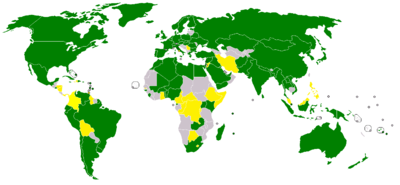Outer Space Treaty
From Wikipedia, the free encyclopedia
Jump to: navigation, search
This article needs additional citations for verification.
Please help improve this article by adding reliable references. Unsourced material may be challenged and removed. (November 2008)International Ownership Treaties
Outer Space Treaty
The Outer Space Treaty, formally known as the Treaty on Principles Governing the Activities of States in the Exploration and Use of Outer Space, including the Moon and Other Celestial Bodies, is a treaty that forms the basis of international space law. The treaty was opened for signature in the United States, the United Kingdom, and the Soviet Union on January 27, 1967, and entered into force on October 10, 1967. As of 1 January 2008, 98 countries are states-parties to the treaty, while another 27 have signed the treaty but have not yet completed ratification.[1]
Contents
[hide]
- 1 Key points of the Treaty
- 2 Responsibility for activities in space
- 3 See also
- 4 References
- 5 External links
- 6 Citations
[edit] Key points of the Treaty
The Outer Space Treaty represents the basic legal framework of international space law. Among its principles, it bars States Parties to the Treaty from placing nuclear weapons or any other weapons of mass destruction in orbit of Earth, installing them on the Moon or any other celestial body, or to otherwise station them in outer space. It exclusively limits the use of the Moon and other celestial bodies to peaceful purposes and expressly prohibits their use for testing weapons of any kind, conducting military maneuvers, or establishing military bases, installations, and fortifications (Art.IV). However, the Treaty does not prohibit the placement of conventional weapons in orbit. The treaty also states that the exploration of outer space shall be done to benefit all countries and shall be free for exploration and use by all States.
The treaty explicitly forbids any government from claiming a celestial resource such as the Moon or a planet, since they are the Common heritage of mankind.[2] Art. II of the Treaty states that "outer space, including the Moon and other celestial bodies, is not subject to national appropriation by claim of sovereignty, by means of use or occupation, or by any other means". However, the State that launches a space object retains jurisdiction and control over that object. According to Manfred Lachs, jurisdiction and control is the means for a State to conduct a mission of space exploration.[citation needed] The state is also liable for damages caused by their space object and must avoid contaminating space and celestial bodies.
signed and ratified signed only
[edit] Responsibility for activities in space
Article VI of the Outer Space Treaty deals with international responsibility, stating that "the activities of non-governmental entities in outer space, including the moon and other celestial bodies, shall require authorization and continuing supervision by the appropriate State Party to the Treaty" and that States Parties shall bear international responsibility for national space activities whether carried out by governmental or non-governmental entities.
Following discussions arising from Project West Ford, a consultation clause was inserted in Article IX of the Outer Space Treaty: "A State Party to the Treaty which has reason to believe that an activity or experiment planned by another State Party in outer space, including the Moon and other celestial bodies, would cause potentially harmful interference with activities in the peaceful exploration and use of outer space, including the Moon and other celestial bodies, may request consultation concerning the activity or experiment."
[edit] Follow-ups
- The Moon Treaty of 1979 was meant to be the follow-up to the Outer Space Treaty, but failed to be ratified by any space-faring nation.
- Both the Space Preservation Treaty and the Space Preservation Act are expansions on the ban of weapons in space, being a ban on all weapons, instead of only nuclear and WMDs, but both so far have had minimal success.
[edit] See also
- High altitude nuclear explosion
- Militarization of space
- Space law
- Space Preservation Treaty
- Fractional Orbital Bombardment System
- Dennis Hope
[edit] References
- J. Hickman and E. Dolman. "Resurrecting the Space Age: A State-Centered Commentary on the Outer Space Regime." Comparative Strategy. vol. 21, no. 1, (2002).
[edit] External links

Wikisource has original text related to this article:
- International Institute of Space Law
- Full text of the "Treaty on Principles Governing the Activities of States in the Exploration and Use of Outer Space, including the Moon and Other Celestial Bodies" in Arabic, Chinese, English, French, Russian, or Spanish
- "Space Law Probe""
- The Case for Withdrawing From The 1967 Outer Space Treaty
- Still Relevant (and Important) After All These Years: The case for supporting the Outer Space Treaty
- Squadron Leader KK Nair's "Space:The Frontiers of Modern Defence" Knowledge World Publishers, New Delhi, Chap-5 (Examining Space Law...), Pg 84–104, available at [1]
- "Land Sale's over the moon" Sydney Morning Herald, 13 October 2003
[edit] Citations
- ^ "Treaty on Principles Governing the Activities of Statesin the Exploration and Use of Outer Space, includingthe Moon and Other Celestial Bodies". 1/1/08. http://www.oosa.unvienna.org/oosa/SpaceLaw/outerspt.html. Retrieved 2/7/10.
- ^ Jennifer Frakes, The Common Heritage of Mankind Principle and the Deep Seabed, Outer Space, and Antarctica: Will Developed and Developing Nations Reach a Compromise? Wiscoscin International Law Journal. 2003; 21:409
Retrieved from "http://en.wikipedia.org/wiki/Outer_Space_Treaty"
Categories: Arms control treaties | Cold War treaties | Treaties of the Soviet Union | Soviet Union – United States relations | Treaties of the United States | Nuclear weapons policy | Space weapons | Space law | 1967 in space exploration | 1967 in military history | Treaties establishing nuclear-weapon-free zones | Treaties concluded in 1967 | Treaties entered into force in 1967
Hidden categories: Articles needing additional references from November 2008 | All articles needing additional references | All articles with unsourced statements | Articles with unsourced statements from November 2008

